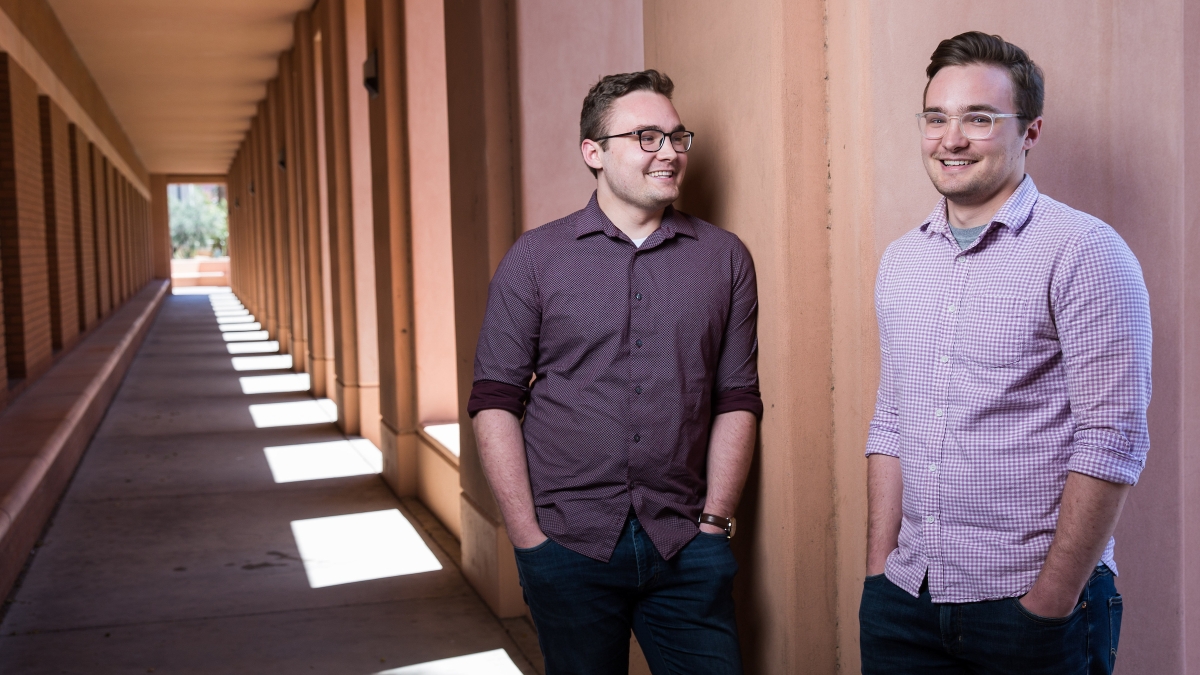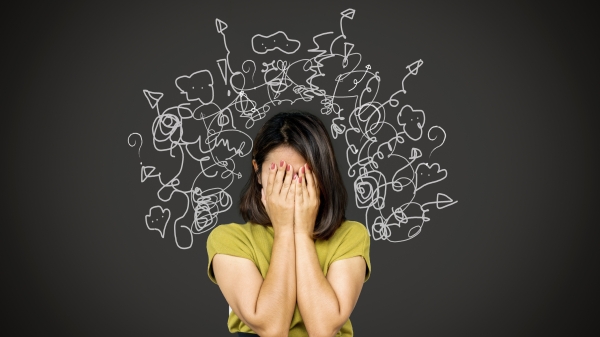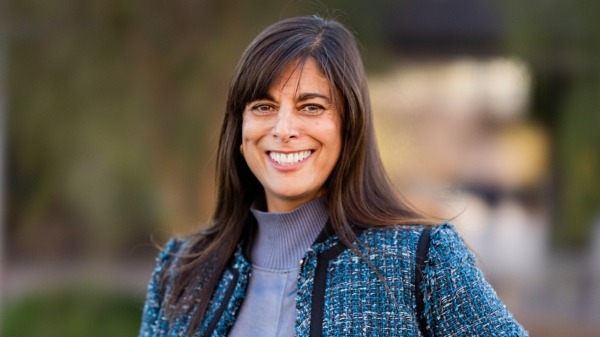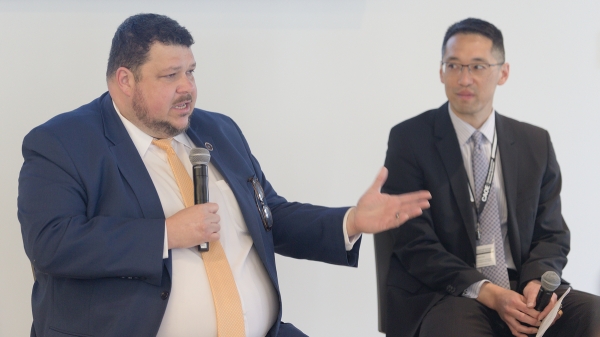Twins match each other with outstanding grad awards
Austin and Daniel Cotter are tops in their fields at ASU's School of Life Sciences

Editor’s note: This is part of a series of profiles for spring 2018 commencement.
Meet Austin and Daniel Cotter, possibly better known as the Wonder Twins. The graduates from Arizona State University’s School of Life Sciences each received Outstanding Student of the Year awards in their respective concentrations.
Austin won the award in neurobiology, physiology, and behavior while Daniel won in genetic cell development.
The 22-year-old Phoenix natives both are headed for careers in medicine.
After graduation, Austin will be spending a year abroad in Spain on a Fulbright scholarship teaching English, then returning for medical school at the University of Arizona’s Phoenix campus. Daniel plans to pursue a PhD in genetics at Stanford.
They credit Barrett, The Honors College, as the draw to attend ASU.
“We toured Barrett and really enjoyed it,” Daniel said. “And in-state (tuition) is nice because the cost is lower. I still really liked the program, so it worked out for me.”
“Barrett was the clear draw here,” Austin said. “But ASU also has a lot of research opportunities. I was able to join a lab freshman year and have that research opportunity there.”
Question: What was your “aha” moment, when you realized you wanted to study the field you majored in?
Daniel: I joined a lab freshman year, just to get some experience. I didn’t really know what I wanted to do with it, but I knew I wanted some research experience because I was in biology. … About two years in I was working on publishing a paper with another undergrad and my (principal investigator). I did this — I created something novel for the field. That’s when I switched my major from just biology to biology with an emphasis on genetics. That’s when I decided to pursue that path of genetics.
Austin: Coming into ASU I chose biology because I like science but I wouldn’t say it was an aha moment. … I had the opportunity to donate bone marrow my sophomore year. After that, I changed my stance from "I like science and researching" to "I can use science and knowledge of medicine to actually help people." I got to see the doctors interacting when they did my bone marrow surgery. That was really meaningful to me, how easy they made my surgery. I also want to have meaningful relationships with people in my career, and that was my aha moment when I realized I want to study medicine.
Q: What’s something you learned while at ASU — in the classroom or otherwise — that surprised you, that changed your perspective?
Austin: Living in Barrett with a variety of different people and different majors, I got to learn about the really diverse group of people here at ASU. The diversity of people, why they are here, whether they’re pursuing business, whether they’re pursuing engineering, and why … it was eye-opening to me the variety of reasons people are here at college in the first place.
Daniel: There have been little moments but one that immediately comes to mind is I’m in a positive psychology class right now. It’s not necessarily exactly for my major but I grabbed it to do my psychology minor. This whole class is about being the best you can be in life. I’m trying to take away being competitive getting into grad school and getting the best job isn’t going to be as important to me. What I’ve really understood is that being happy in the moment and having meaningful relationships with people and trying to optimize myself in whatever situation I’m in is more important that getting accepted to Harvard or getting a 4.0 GPA.
Q: What’s the best piece of advice you’d give to those still in school?
Austin: Look for research opportunities, any opportunity outside of the classroom. That’s one of the best things you can find at ASU. There are professors you can do research with, there are internships. I think I learned a lot outside the classroom: I learned a lot through mentorship and the activities I did hands-on in a lab. Obviously you can learn, but take what you learn and apply it something, because that’s when you’re going to learn the most.
Daniel: What I found was you shouldn’t do what you think your future career wants you to do. You should do what you find enjoyment in. I work in Gammage, for instance. It’s just a job to make money, but I enjoy theater, and I don’t really have an outlet for that as a biology major. … That’s brought me more enjoyment than joining a club tailored to pre-med students because I think that would help my application to med school. Tailoring yourself to what you enjoy rather than an application has made me a thousand times happier than joining every club I think I should join.
Q: What was your favorite spot on campus, whether for studying, meeting friends or just thinking about life?
Daniel: I really liked the bottom floor of Hayden (Library). I know it’s not pretty, but that’s where I could go to study and it was open and available. I had a lot of friends on campus and we’d just meet there to study. I could go and focus and still have friendships.
Austin: I really do like Gammage, the lawn outside — I’ve sat there just reading. When there’s not a bunch of buses going by it’s really quiet and nice to sit there.
Q: If someone gave you $40 million to solve one problem on our planet, what would you tackle?
Daniel: At TGen, the lab downtown, they study childhood diseases and stuff like that. They rely mostly on private donations. I feel research like that is the way to realistically solve problems in the future. That’s one of the reasons I chose science in the first place. I’d probably throw that money at various diseases that could feasibly be solved by $40 million.
Austin: It’s a similar answer for me. Throw money at research. Not to say that there isn’t a benefit in throwing money at organizations that raise money for research — we’ve done crowdfunding in my lab to raise money for research for projects we didn’t have grants for.
Above photo: Twin brothers Daniel (left) and Austin Cotter pose for a portrait on the Tempe campus on April 17, 2018. Both brothers are biological sciences majors with Daniel specializing in genetics, cell and developmental biology and Austin in neurobiology, physiology and behavior. Photo by Deanna Dent/ASUNow
More Science and technology

The science behind chronic stress
Stress comes in many shapes and sizes. There’s the everyday stress of preparing for a final exam or being stuck in traffic. And the more significant stress of losing a friend, family member,…

ASU planetary scientist to be inducted into the National Academy of Sciences
The National Academy of Sciences is inducting School of Earth and Space Exploration Director Meenakshi Wadhwa into the 2023 class of new members for her pioneering work in planetary sciences and…

Unlocking the potential of AI for homeland security
“Can we do what we're doing now cheaper, more efficiently, more effectively?” Adam Cox, director in the Office of Strategy and Policy at the Department of Homeland Security Science and Technology…